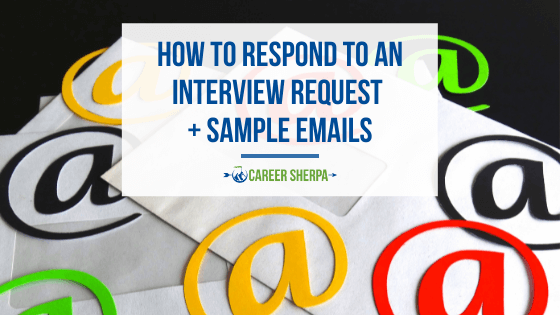Determining how to respond to an interview request can be a surprisingly daunting task. After all, you want to leave a great impression and start off on the right foot!

This guide will help you reply to an interview request quickly and effectively. We even provide some sample emails to make the process easy.
How to Respond to an Interview Request
Getting an elusive interview request can feel like a massive relief after an exhaustive job search, but the hiring process is just beginning! Everything you do moving forward shapes the hiring manager’s impression of you, making or breaking your chances of getting a job offer. That includes how you respond to an interview request.
Most hiring managers rely on email communications to extend requests. Chances are, it’s the first interaction you have with anyone at the organization. The best approach is to treat it like another opportunity to make yourself look like the ideal candidate for the job.
Here are a few crucial tips to follow when replying to an interview email.
1. Respond Promptly
One of the best ways to impress a potential employer is by responding to their interview request promptly.
Ideally, you should craft a response on the same day. If that’s not possible, 24 to 48 hours will suffice. As a general rule, the sooner you reply, the better.
Remember that hiring managers and recruiters often extend interview offers to multiple applicants. Being one of the first to reply can make you stand out from the crowd.
It shows that you’re on top of things and eager to get the ball rolling.
Furthermore, it usually offers greater flexibility with interview scheduling. If you don’t have an open schedule, responding to the email promptly could help you land a time slot that’s more convenient for you.
Before starting your job search, consider setting up push notifications and alerts for your email. Check it frequently and try your best to send a response within hours. That’s plenty of time to check your schedule and craft a professional email.
Waiting more than 48 hours to respond to an interview request will likely leave a negative impression. It might make you come off as lazy, not interested, or even unprofessional. Some hiring managers may even rescind the offer if you don’t respond in a timely manner.
2. Be Polite, Enthusiastic, & Professional
This tip might seem like a given, but we can’t stress enough about maintaining a professional tone when responding to an interview request. Hiring managers take notice of those small details, and how you communicate in your reply email says a lot about what you’ll bring to the table as an employee.
If you’re not being professional now, who’s to say that you’ll be professional when representing the organization?
Start your emails showing your enthusiasm. That’s an excellent way to set the tone of the email and express gratitude for the consideration. Try to show interest and gratitude in the very first full sentence of the email.
Of course, be polite and make it a point to stay formal. You don’t have to gush over the opportunity, but a brief sentence to say “thank you” makes a big difference.
For the rest of the email, follow all standard professionalism practices. That means having a formal tone, using proper email structure, and communicating in a business-focused manner.
Always provide formal greetings and refer to the hiring manager by full name. Avoid any slang terms or text chat. Type out every word and treat the email as a professional document like your resume.
Don’t forget to close the email with formal salutations. Words like “sincerely” and “regards” might seem outdated, but they’re universal formalities. After that, close the email with your full name and contact information.
3. Address Essential Details & Questions
In addition to extending an interview offer, a hiring manager may ask additional questions in their email. Answer them to the best of your ability in your response and provide as much clarification as they need.
For example, you might get a few follow-up questions as they review your application or resume. They could be about your job history or salary expectations. Address those concerns concisely, but don t go overboard.
Ideally, you’ll want to address salary negotiations after receiving a formal job offer (here s a guide that breaks down how to answer desired salary questions). The same goes for any topic involving long responses. Save those for the interview.
You can take the opportunity to confirm interview details and ask small follow-up questions yourself. Confirm the time and location of the interview. If they give you the chance to choose a time that works best for you, provide your availability.
This initial response to their interview request is also a suitable time to ask if you need to bring anything with you. For example, a recruiter might want a hard copy of your resume or a work sample. Clarify those details and address anything unclear about the interview process.
Save the in-depth questions for the interview itself. It’s better to perform your own research and talk about broader information in person.
4. Keep It Brief
Do your best to keep things concise. Don’t beat around the bush or waste time gushing over the opportunity. It’s one thing to express gratitude, but it s another to waste time with over-the-top appreciation.
The last thing you want to do is send a lengthy email when replying to an interview request. The hiring manager who emailed you likely has similar messages to read from many other applicants. Depending on the size of the company, they might spend several weeks doing interviews. That’s a lot of follow-up emails to read!
Most hiring managers are looking for essential information. Do you accept the interview, and what times are suitable for you? Anything too long will cause the reader to gloss over the important details.
Some recruiters might see a block of text and immediately remove you from the running.
How long should your email response be? Generally, two carefully worded paragraphs will suffice. That’s enough to be appreciative, confirm the interview details, and ask any questions you might need.
A concise email can sometimes be more impactful than a drawn-out one with too much superfluous fluff. Keep it short and professional.
5. Proofread Before You Hit Send
Last but not least, proofread everything – especially the spelling of the person’s name and the company! Some job-seekers make the mistake of thinking that an email response for an interview request doesn’t need proofreading. While it might not be an “official” work document, every small detail counts.
You’re trying to make a positive impression and start the interview phase off on the right foot. You can’t do that if your reply is rife with errors!
Simple spelling mistakes and grammatical errors send the wrong first impression. It doesn’t matter what type of job you’re trying to get or if spelling matters to the job at hand. Sending an error-free message is crucial.
You want to show that you re taking the process seriously. There’s no need to get extra fancy and stuff your emails with five-dollar words. But it should be free of simple mistakes.
Run the email reply through spelling and grammar checks. Then, read it out loud! Reciting the message aloud can help you spot issues that even the most powerful checkers can miss.
If possible, have someone else give your response email a quick read-over. They’ll be able to provide you with some outside perspective on voice, overall professionalism, and more.
There’s no way to “overdo” proofreading, so read it as many times as you need to feel confident about your response before hitting that “send” button!
Reply Email Examples
How you respond to an interview request will vary based on what the recruiter sends and the details surrounding your job search. If you’re still unsure of what to say, we have a few examples to help you start writing an email response.
Sample 1: Accepting & Confirming
Here’s the most straightforward response email you’ll write. In this example, you’re getting an interview offer that you want to accept.
The goal here is to let the hiring manager know that you will come in. It’s also a time to confirm the interview details to ensure that everything is clear and ready to go.
Dear Sally Johnson,
Thank you for considering me for the position of Customer Relationship Manager at [Company]. I’m thrilled to meet with you and discuss this opportunity further. I want to confirm that I am available to come to your office next Tuesday, August 10th, at 9:00 AM.
I’m looking forward to meeting you in person. Please let me know if you require any additional information or documentation from me before then.
Sincerely,
[Your Name]
[Email]
[Phone Number]
[LinkedIn URL]
This interview email response is brief, to the point, and simple enough to work for most email responses. It maintains a professional tone and shows your eagerness to come in for an interview. More importantly, it confirms the details of the interview so that there’s no confusion about scheduling or location.
You can add another paragraph if there are questions you need to answer. But if the hiring manager’s email has everything you need, this short email will do just fine.
Sample 2: Rescheduling
Sometimes, hiring managers will request interviews at time slots that don’t work for you. This is a pretty common occurrence among those actively looking for a new job while still working for another company. In most cases, scheduling conflicts are perfectly understandable.
Hiring managers understand that every applicant’s current job situation or availability isn’t always flexible, so they’re usually open to changing things if necessary.
The goal here is to ask for a better time that works for you. However, you must express interest and some flexibility on your part. The hiring process isn’t easy for anyone involved, so you may need to make adjustments on your end to accommodate the interview, too.
Here’s a professional reply to an interview request for situations when you need to reschedule an interview.
Dear Sally Johnson,
Thank you so much for considering me for this opportunity at [Company] and for reaching out to schedule an interview. Unfortunately, my current work schedule limits my availability during the proposed times. Are there any other alternative time slots available to reschedule our meeting?
I’m very interested in working for [Company], and I’m eager to meet with you to discuss the opportunity further. Next week, I’m available Tuesday through Friday between the hours of 9:00 AM and 11:00 AM. If you have no availability during those times, please let me know so that I can arrange time off to meet with you.
Once again, thank you for this opportunity, and I look forward to hearing from you.
Kind regards,
[Your Name]
[Email]
[Phone Number]
[LinkedIn URL]
This email response is an excellent example of requesting a different time slot while remaining respectful. Simply saying that a proposed interview time doesn’t work for you isn t enough. Failing to make an effort to help arrange another time can leave a bad impression.
Sample 3: Declining
Our last example is for a situation where you want to decline an interview. There are many reasons you might want to end the job search before it goes any further.
Maybe you’ve already accepted a job at another company. And if you re applying for multiple jobs, there’s a good chance you’ll get an offer or two that you have to decline.
In some cases, you might learn more about the organization and decide that you’re not a good fit for the position. Either way, your reasons for declining are valid.
Regardless of your reasoning, it’s still important to respond to the interview request. Doing so ensures that the hiring manager doesn’t waste any time waiting for you to reply. They can give your interview time slot to someone else and move on with the hiring process.
Furthermore, it maintains that sense of professionalism you need to protect your reputation. You might not work for that company now, but what about in the future? Word travels fast, and you don’t want to burn any bridges.
Sending a simple reply to decline the interview will pull you from consideration without leaving any bad blood between you and the organization.
Here’s a sample email to help you out.
Dear Sally Johnson,
Thank you for reviewing my application and extending an interview offer. However, after further consideration and review, I don’t believe that I am the right match for the position at [Company].
I must respectfully decline your interview offer. Thank you for the consideration, and I wish you luck finding a suitable candidate for the role.
Sincerely,
[Your Name]
[Email]
[Phone Number]
[LinkedIn URL]
This email is to the point and provides a firm “no.” However, it doesn’t disparage the company or leave the wrong impression. It’s kind, respectful, and ensures that you’re not wasting anyone’s time.
It’s best to send these emails as quickly as possible. That way, the hiring manager can move on to the next candidate.
Conclusion
As you can see, responding to an interview request isn t tricky. As long as you follow the simple tips we listed above and don t overcomplicate things, you ll be just fine. If you need help getting started, simply take our sample email replies and customize them to fit your particular situation.
Good luck in the interview!
The post How To Respond To An Interview Request + Sample Emails appeared first on Career Sherpa.














